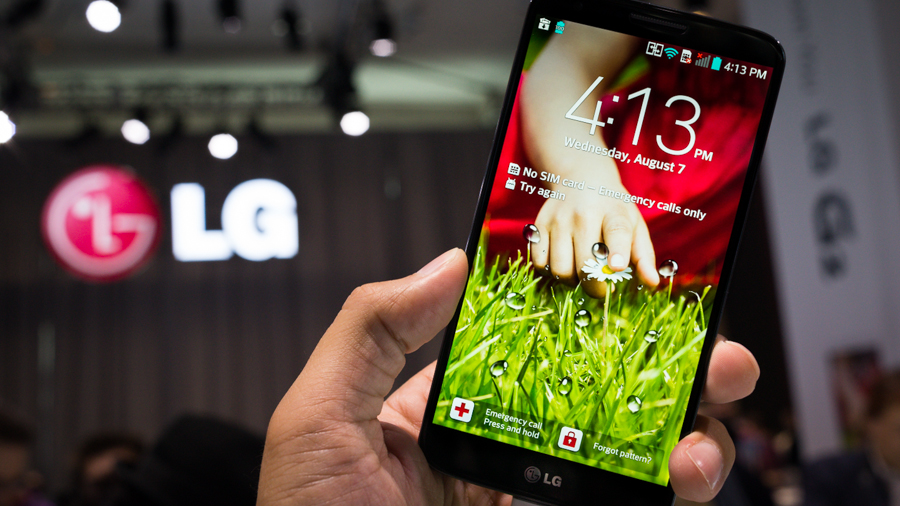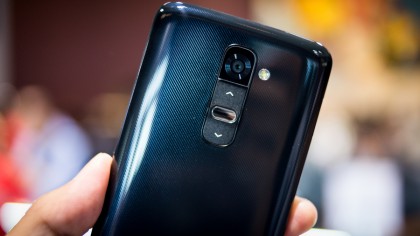LG's phone return sees us focusing on its rear
LG is hoping you'll be glad to see the back of the LG G2

We always worry when firms start chucking words like "paradigm" around: it's often misused to describe a device with slightly rounder corners. LG reckons it's done something much more dramatic, though: on the brand new LG G2, the volume buttons aren't on the side. Oh no. They're on the back.
The device formerly known as the LG Optimus G2 has a 2.26GHz Snapdragon 800 processor, a choice of 16GB or 32GB internal storage, 2GB of RAM and a full HD 5.2-inch display. It looks good on paper, but what about the reality?
Time to unleash smartphone guru Gareth Beavis: it's "insanely powerful", the screen is "huge" and that fast processor "makes the phone tick along quite nicely" while delivering all-day battery life.
The on-board audio is "highly impressive" on headphones, although the headphone jack has been moved to the bottom of the device to annoy you.
Overall, Beavis says, it's a bit of a mixed bag: while the specs are great "the design is middling, the implementation of Android 4.2 only so-so, and there's nothing here that will really claim the headlines."
Floptimus?
We know what you're thinking. How does it compare to the Samsung Galaxy S4, the HTC One and the iPhone 5? James Rogerson has the answer. It's good, but "we're not sure it's any better" than its rivals. LG "is likely to have a hard time convincing consumers [that] they should buy it."
Never mind specs: can smartphones have souls? Marc Flores thinks so - but he doesn't think you'll find one in the G2. "The LG G2 is probably everything you could possibly want an Android smartphone to be, at least in terms of hardware," he says, but "it doesn't leap out at us or cause any stir or excitement."
Get daily insight, inspiration and deals in your inbox
Sign up for breaking news, reviews, opinion, top tech deals, and more.

The rest of the TechRadar team agree. "Nothing jumps out at me," says our US mobile devices editor, Marc Flores. UK editor in chief Patrick Goss is "not convinced it 'shifts the paradigm in smartphone design' as LG suggests", while news editor Kate Solomon is "worried about this buttons-on-the-back nonsense".
The buttons are "a terrific gimmick," but "no more than a gimmick... it makes little sense," says associate editor Dan Grabham, but global editor in chief Paul Douglas begs to differ: "I'm forever switching the screen off by accident when taking a photo or nearly dropping my phone while trying to change the volume during a call, [so this] seems like a smart idea."
Ban or boycott
Smartphones are great things, but like all technologies they can be used for ill - and this week we heard terrible tales of online abuse by cyberbullies.
The UK Prime Minister "used a lot of words to say not very much", Kate Solomon reports: amid calls for government bans on sites such as Ask.fm, Cameron said that "the people that run these websites have got to step up to the plate, clean up their act and show some responsibility."
And if they don't? "We as members of the general public have got to stop using these particular sites and boycott them." We suspect that the mass exodus of Ask.fm advertisers over the bad publicity is more likely to have an effect.
Calls for bans are understandable but misguided, says Gary Marshall: "Anybody who's ever been bullied knows that if you close down one avenue, the bullies will find another."
Leaving aside "the slippery slope of creeping censorship", website bans won't change the underlying problem: "bullies simply don't think anybody will tell their teachers, or their parents, or call in the authorities."
As Marshall points out, cyberbullying is covered by several laws, and in England head teachers can discipline pupils for bullying that takes place outside school premises and hours.
"This isn't a technological problem. It's a cultural one," Marshall says. "As long as bullies' actions don't have consequences, as long as other children join in or stay silent when they see it happen, as long as victims stay quiet instead of confiding in someone - someone who can and will do something about it - then the problem will continue... if the best solution we can come up with is blocking a URL, then we're failing our children terribly."
Writer, broadcaster, musician and kitchen gadget obsessive Carrie Marshall has been writing about tech since 1998, contributing sage advice and odd opinions to all kinds of magazines and websites as well as writing more than a dozen books. Her memoir, Carrie Kills A Man, is on sale now and her next book, about pop music, is out in 2025. She is the singer in Glaswegian rock band Unquiet Mind.
